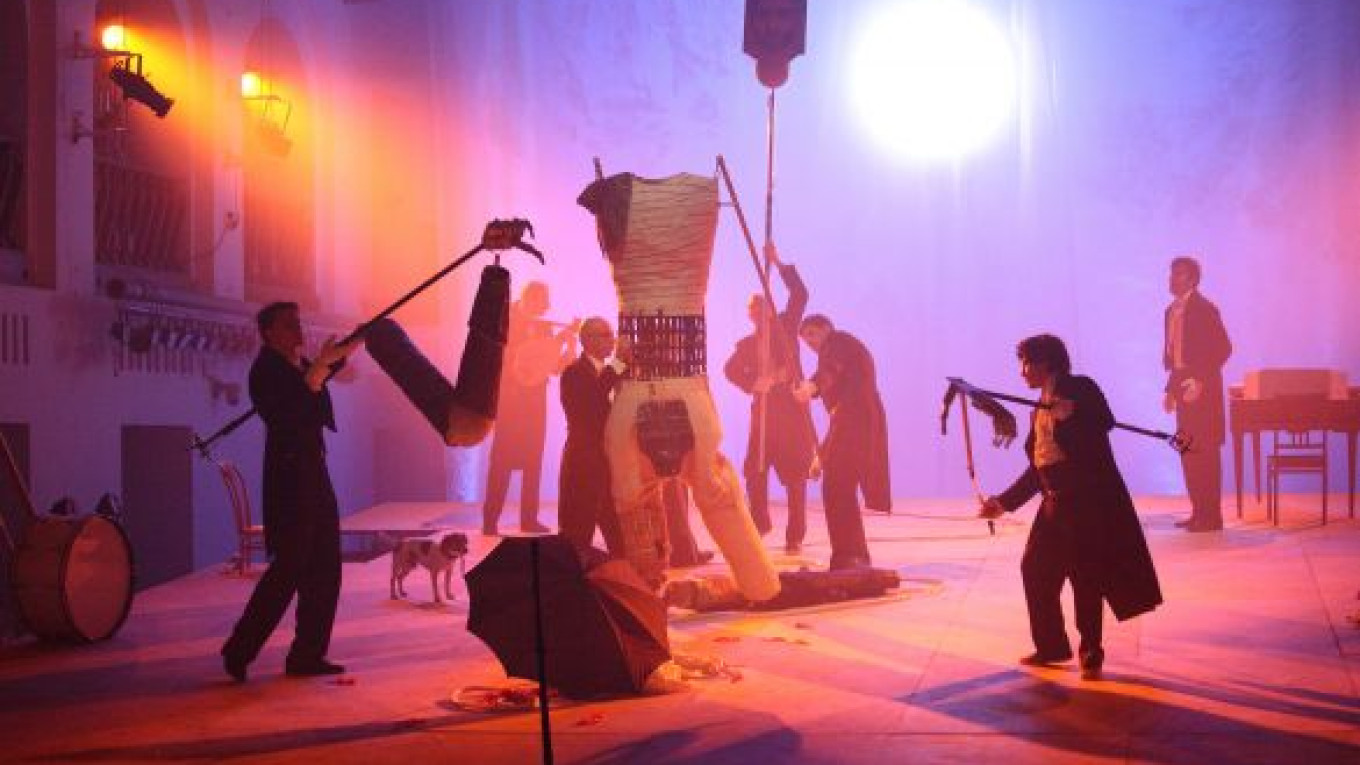I do my level best to offer none but my own opinions in my articles. In regards to Dmitry Krymov's new production slyly entitled "As You Like It" at the School of Dramatic Art, however, I am compelled to quote my wife. Following a press showing we attended last week she turned to me and said, "Every new Krymov show is like a new fruit."
Would that I could invent phrases like that.
Despite its title, Krymov's latest opus is a scintillating excursus on the themes of William Shakespeare's "A Midsummer Night's Dream." More specifically it is an interpretation of the Act Five play-within-the-play wherein some craftsmen stage a play for the royalty of Athens. More truthfully it is a crazy, inventive, comical, acrobatic, touching, freewheeling improvisation on the nature and essence of theater.
But I prevaricate. It is no improvisation at all, for this delightful, purposefully heavy-handed performance is measured to the last millimeter. It must be when objects and actors tumble in the direction of audience members, pieces of the set break and crash to the floor, torrents of water spray in all directions and an inquisitive fox terrier is constantly underfoot.
The improvisation of which I speak occurred during rehearsals and you see those moments of invention and discovery embedded in the performance that now exists as a "finished product." The "finished product" wheezes, coughs, chokes, sputters, falls, flops and spins in place while soaring to heights most often associated with the sublime.
Imagine the Keystone Cops in "Hamlet" and you have some idea of what I mean.
I would love to provide detailed descriptions of this show's inspired scenes, tricks and jokes. But every secret revealed is a knife in a performer's back, an affront to the director and a disservice to future spectators.
Allow me to be vague.
The audience first bursts into laughter when a huge, wiggling, fake tree trunk carried clumsily by 10 or 15 actors disappears pointlessly over the horizon of the artificially raised plywood stage designed by Vera Martynova. A second wave of guffaws erupts as the actors lug a phony-looking, though quite functional, water fountain down the center aisle splitting the audience in half.
Suffice it to say that two audience members quickly pulled out umbrellas. They clearly had read the ecstatic reviews that greeted the world premiere of this production at the Edinburgh Festival in August.
What we witness is a group of craftsmen attempting to mount a theatrical show. As the narrator (Sergei Melkonyan) tells us, it's a story of love and everybody loves those. Although he also admits the ones we usually remember end in disaster: Romeo and Juliet done in by innocence, lust and stupidity; Sergei Yesenin and Isadora Duncan and her death by twisted scarf around the neck; Vsevolod Meyerhold and Zinaida Raikh, both murdered by the Soviet secret police.
Krymov's company enacts the tragedy of Pyramus and Thisbe, the star-crossed lovers whose intended tryst in the woods was aborted by a ferocious lion and ended in double suicide. The touching young lovers are represented by four-meter puppets controlled with exquisite sensitivity by six to nine performers. They tenderly clutch bouquets, gently wipe away tears and flutter eyes flirtatiously even as legs or arms, sometimes even heads, disastrously clatter to the ground.
The part of Thisbe is sung with heart-rending sincerity by Anna Sinyakina. The knightly Pyramus is given envious chutzpah by Alexei Kokhanov. Valery Garkalin plays the brusque, businesslike Shakespeare figure desperately seeking to keep things functioning. Many of the craftsmen are played by actual stagehands, including Sergei Nazarov, who declares that the actors' job is to make sure the spectators don't realize they don't like the show.
Krymov also provides four loges full of pompous spectators who are as certain of their ability to appreciate the avant-garde as they are wont to be scandalized. Their indignation climaxes during a near-sex scene when Pyramus' youthfully tender member is made to grow in proportion to his affections for Thisbe by Garkalin's Shakespeare furiously working an air pump.
The lead spectator, if you will, is played with cutting dryness and perfect comic timing by the beloved Lia Akehdzhakova of the Sovremennik Theater.
This "As You Like It" clearly emerges from the same creative cauldron that has produced so many of Krymov's popular productions. But, as my wife suggested so astutely, there is something entirely new and irresistibly tasty about this marvelous piece of living, breathing and untamable theater.
"As You Like It" (Kak Vam Eto Ponravitsa) returns to repertory in December at the School of Dramatic Art, located at 19 Ulitsa Sretenka. Metro Sukharevskaya. Tel. (495) 632-9344. . Running time: 1 hour: 45 minutes.
Related articles:
A Message from The Moscow Times:
Dear readers,
We are facing unprecedented challenges. Russia's Prosecutor General's Office has designated The Moscow Times as an "undesirable" organization, criminalizing our work and putting our staff at risk of prosecution. This follows our earlier unjust labeling as a "foreign agent."
These actions are direct attempts to silence independent journalism in Russia. The authorities claim our work "discredits the decisions of the Russian leadership." We see things differently: we strive to provide accurate, unbiased reporting on Russia.
We, the journalists of The Moscow Times, refuse to be silenced. But to continue our work, we need your help.
Your support, no matter how small, makes a world of difference. If you can, please support us monthly starting from just $2. It's quick to set up, and every contribution makes a significant impact.
By supporting The Moscow Times, you're defending open, independent journalism in the face of repression. Thank you for standing with us.
Remind me later.


